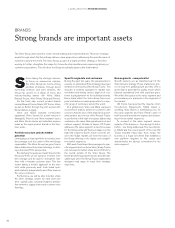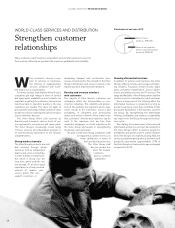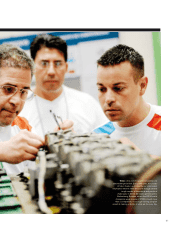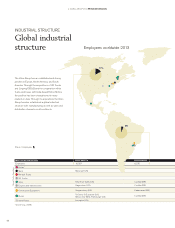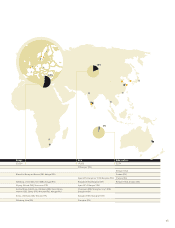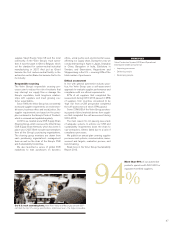Volvo 2013 Annual Report Download - page 43
Download and view the complete annual report
Please find page 43 of the 2013 Volvo annual report below. You can navigate through the pages in the report by either clicking on the pages listed below, or by using the keyword search tool below to find specific information within the annual report.
Fuel costs represent between 25% and 35% of total haulage fi rm
costs. At the same time, the hauliers’ profi t margins are often very
small, which means that all savings make an important difference.
In order to succeed in cutting the haulage fi rm’s overall fuel con-
sumption, the part played by the drivers is vital. Driver training
courses in eco-driving have proven themselves to be effective, but
without professional follow-up the results are often short-term.
That is why the Volvo Group’s various businesses offer extensive
services in this area. Some of them are described below.
Volvo Trucks Fuel Advice
Volvo Trucks’ new Fuel Advice is a personal fuel advisor whose
aim is to help hauliers cut their fuel costs while at the same time
maintaining these improvements in the long-term perspective.
The results are long-term, with savings as high as 5%. Fuel Advice
consist of three modules:
1) Fuel Coaching. The fuel advisors register and analyze each driv-
er’s individual driving techniques. The advisors provide practical
tips on how fuel consumption can be reduced, as well as help
with planning and with structuring the necessary follow-up.
2) Fuel Management Toolbox. A web-based toolbox with tools
that provide inspiration, guidance and practical information
about the best and simplest ways of working with fuel savings.
3) Fuel Management Support. The customer’s interface for con-
tacts with his or her individual fuel advisor, who is there to
answer questions and offer advice.
Fuel Advice is primarily targeted to small and medium sized com-
panies and complements Volvo Trucks’ existing Fuel Management
Service, which is primarily designed for larger haulage fi rms.
Renault Trucks Optifuel
Renault Trucks offers customers the possibility for further increas-
ing the savings through its Optifuel solutions, which is a structured
offer addressing four main areas:
1) Confi guration of the truck – use the right technology (i.e. Opti-
driver, Optiroll, Optitrack) and the right equipment (i.e. defl ec-
tors, tyres) for the transport application at hand
2) Training the people – use Renault Trucks’ “in-house” training
program, based on thirty years of experience that enables fuel
savings up to 15% across a whole fl eet
3) Monitoring the fuel consumption – use the right tool (i.e. Opti-
fuel Infomax and Optifl eet) to manage drivers and trucks
4) Maintaining long-term performance – use the Renault Trucks
service network’s know-how and experience, the latest techni-
cal innovations (i.e. Optifuel Retrofi t) in order to maintain fuel
effi ciency throughout the truck’s entire operational life.
Eco Operator from Volvo CE
EcoOperator is a training program from Volvo Construction Equip-
ment that gives operators the practical and theoretical knowledge
they need to become safer, more effi cient and extra environ mentally
conscious while operating equipment. No matter how fuel effi -
cient a piece of equipment is, the operator has a signifi cant effect
on fuel consumption and productivity.
The program teaches correct machine operation and maneuver-
ing as well as how to plan work in the smartest, most effi cient way.
By following these techniques operators can help save money on
fuel, increase overall productivity, reduce maintenance expenses
and reduce the impact on the environment.
Effi cient driving with Volvo Buses
Fuel costs represent approximately 20% of a bus operator’s costs.
Volvo Buses offers a range of services aimed at minimizing fuel
consumption. With the Fleet Management Report, the customer
can measure and follow up each vehicle’s performance in terms of
fuel effi ciency and emissions. Volvo I-Coaching is a tool located on
the dashboard in the bus which gives instant feedback on driver
behavior, helping the driver to drive more economically and safely.
Volvo Buses also offers courses in Effi cient Driver Training. In total,
these measures can deliver fuel savings of about 10%.
Training and advice to save
even more fuel
In addition to products at the forefront in terms of fuel effi ciency, the Volvo Group
also offers training and advice that can contribute to further fuel savings.
Volvo Fuel Advice
39



